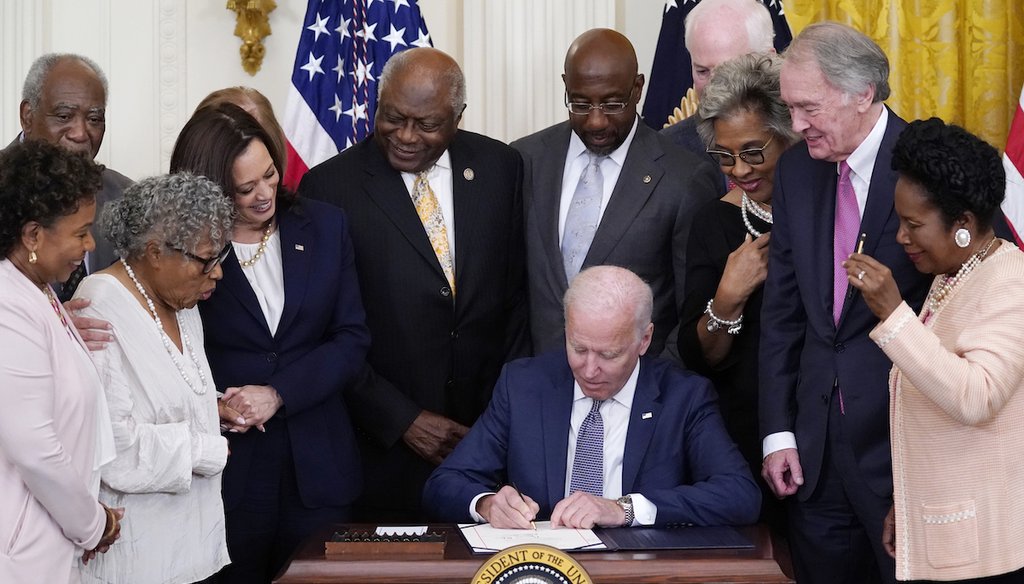Stand up for the facts!
Our only agenda is to publish the truth so you can be an informed participant in democracy.
We need your help.
I would like to contribute

President Joe Biden signs the Juneteenth National Independence Day Act, at the White House on June 17, 2021, surrounded Vice President Kamala Harris and members of Congress. (AP)
If Your Time is short
-
June 19 marks the day in 1865 that Union troops landed in Galveston, Texas, and announced the end of slavery.
-
President Joe Biden made Juneteenth a federal holiday in 2021.
-
Only 18 states recognize it as an official state holiday with time off for state employees.
-
Private employers are not required to pay employees for holidays, though many often do.
This year marks the 157th anniversary of Juneteenth but only the second year it’s been celebrated as a federal holiday.
Juneteenth, which commemorates the end of slavery in the U.S., garnered national attention in 2020 after the killing of George Floyd. While the nation underwent another racial reckoning, advocates fought for solidified recognition for June 19, 1865, as an important day.
President Joe Biden signed the bill into law June 17, 2021, making Juneteenth the 11th federal holiday. Because Juneteenth falls on a Sunday this year, nonessential federal workers will have Monday off work.
Even though the legislation had widespread bipartisan support — the Senate voted unanimously and the House voted 415-14 to make it a holiday — states have been slow to follow suit and give state government employees the day off work.
Every state, including Washington, D.C. observes Juneteenth in some form, but recognition varies, and it does not necessarily mean it is celebrated as a legal holiday.
For example, Rhode Island’s 2012 legislation urges citizens "to recognize the historical significance of Juneteenth," but it’s not a state holiday. South Carolina has considered Juneteenth a state holiday since 2008, along with its 36 other special days of recognition, but state employees do not have the day off work.
Only 18 states have passed legislation that recognizes Juneteenth as a permanent paid holiday, similar to the federal legislation, according to a 2022 Congressional Research Service report. Texas was the first state to do so, making it an official state holiday with paid time off in 1980. After Texas, the next state to do the same was Virginia in 2020.
Before Juneteenth, the most recent holiday to gain federal holiday status was Martin Luther King Jr. Day in 1983. It wasn't until 17 years later in 2000 that all 50 states would adopt legislation honoring it as a state holiday as well.
Increasingly, more private companies and businesses are offering employees time off for Juneteenth, but not all will be paid. A survey by Randstad USA found that 44% of workers get the day off, but only half of those workers get paid for it. Federal law does not require employers to pay workers for holidays, but many companies offer paid holidays as part of a standard benefits package.
On Sunday, much of the nation will celebrate by attending parades, supporting Black-owned businesses and spending time together. While these celebrations may be new to the mainstream, the tradition is decades-old for the Black community, especially in Texas.
The origins in Galveston, Texas, 1865
President Abraham Lincoln signed the Emancipation Proclamation in 1863, but it wasn’t until two and half years later that it became a reality in Texas. The war ended on April 19, 1865, but enslaved people in Texas, the last bastion of the Confederacy, didn’t learn of the confederacy’s surrender until two months later.
On June 19, 1865, Union Gen. Gordon Granger landed in Galveston, Texas. Granger’s men marched through the city, reading General Order No. 3 at municipal buildings and churches, declaring that all enslaved people were now free.
Awareness of Juneteenth around the country grew as Black people migrated out of the South in the years after the civil war, said historian Mitch Kachun, author of "First Martyr of Liberty: Crispus Attucks in American Memory." By 1920, over 17,000 Black Texans moved away to states from Massachusetts to California. During World War II, thousands more relocated further west to find work in defense industries.
"As Black Texans set down new roots in other regions, they carried along both their struggles for economic and social justice and their Juneteenth traditions," Kachun wrote.
The social justice overtones of Juneteenth became more prominent through the 1950s and 1960s. If any event fused Juneteenth with the Civil Rights movement, it was the 1968 Poor People’s March on Washington.
The Poor People’s March started hundreds of miles from Washington a few weeks after the assassination of Rev. Martin Luther King, Jr. Its messaging drew on an Oklahoman story that a black Union soldier traveled by mule to share word of emancipation outward from Texas.
"Marchers borrowed the widely recognized Juneteenth image of a mule-drawn wagon to deliver their message throughout the South," wrote Colgate University historian Graham Hodges. "Led by a mule, Ralph Abernathy, one of Dr. King's closest assistants conducted the march, stopping at the Lorraine Hotel, where King was gunned down."
The march ended with a ceremony attended by about 50,000 at the Lincoln Memorial on June 19.
Juneteenth.com, one of several efforts to promote recognition of the day, cites the 1968 march as a reason for the large annual marches in Milwaukee and Minneapolis.
After decades of informal celebrations, the Texas Legislature made Juneteenth a state holiday in 1980, and more than 40 years later, the federal government followed.
Our Sources
FederalPay.Org, Federal Holidays, accessed June 17, 2022
Congressional Research Service, Juneteenth: Fact Sheet, June 14, 2022
Randstad USA, Employers: Here’s How to Celebrate Juneteenth, June 16, 2022
National Constitution Center, "How the Martin Luther King Jr. birthday became a holiday," Jan. 17, 2022
Tex. Gov’t Code §662.003
S.C. Code Ann. §53-3-85 (2008)
S.B. 2262, 2011-2012 Leg. Sess. (R.I. 2011)
PolitiFact, "Juneteenth’s 156-year path to becoming a federal holiday: Here’s the history," June 17, 2021
U.S. Congress, Juneteenth National Independence Day Act, June 17, 2021
C-SPAN, News conference on passage of Juneteenth legislation, June 16, 2021
Ballotpedia, Legislative activity associated with Juneteenth, accessed June 17, 2022
Oxford University Press blog, Thoughts on Juneteenth, June 22, 2007
New Literary History, "As White as Anybody": Race and the Politics of Counting as Black, Autumn 2000
Conference on Lincoln and the Civil War in Contemporary America, Celebrating Freedom: Juneteenth and the Emancipation Festival Tradition, Feb. 6, 2009
Galveston History Foundation, JUNETEENTH AND GENERAL ORDER NO. 3, June 10, 2020
National Museum of African American History and Culture, The Historical Legacy of Juneteenth, accessed June 15, 2020
National Juneteenth Observance Foundation, About, accessed June 15, 2020
Truman Library Institute, PROCLAMATION 2824—NATIONAL FREEDOM DAY, Jan. 25, 1949
Oklahoma History Center, Juneteenth, accessed June 17, 2020
Oxford African American Studies Center, Emancipation and the Meaning of Juneteenth, accessed June 17, 2020
Juneteenth.com, History of Juneteenth, accessed June 15, 2020
Civil Rights Digital Library, Series of WSB-TV newsfilm clips of African Americans celebrating and demonstrating as they prepare for the Poor People's March on Washington, 1968, accessed June 17, 2020
PBS, What Is Juneteenth?, accessed June 18, 2020
The Atlantic, The Quintessential Americanness of Juneteenth, June 19, 2017
Wall Street Journal, Trump Talks Juneteenth, John Bolton, Economy, June 18, 2020
Email exchange, Dwayne Jones, chief executive officer, Galveston Historical Foundation, June 16, 2020
Interview, Mitch Kachun, emeritus professor of history, Western Michigan University, June 16, 2020
Email exchange, Anthony Greene, associate professor of African American studies, College of Charleston, June 16, 2020

































